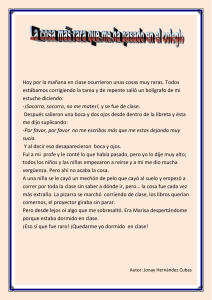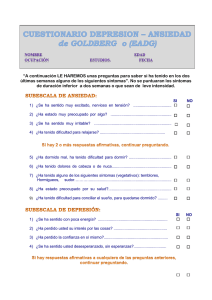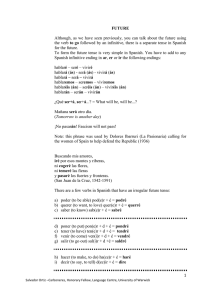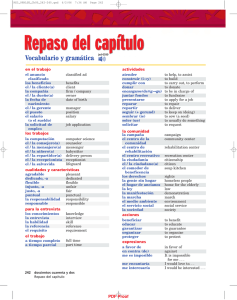1 THE PERFECT TENSE When you want to speak about your recent
Anuncio
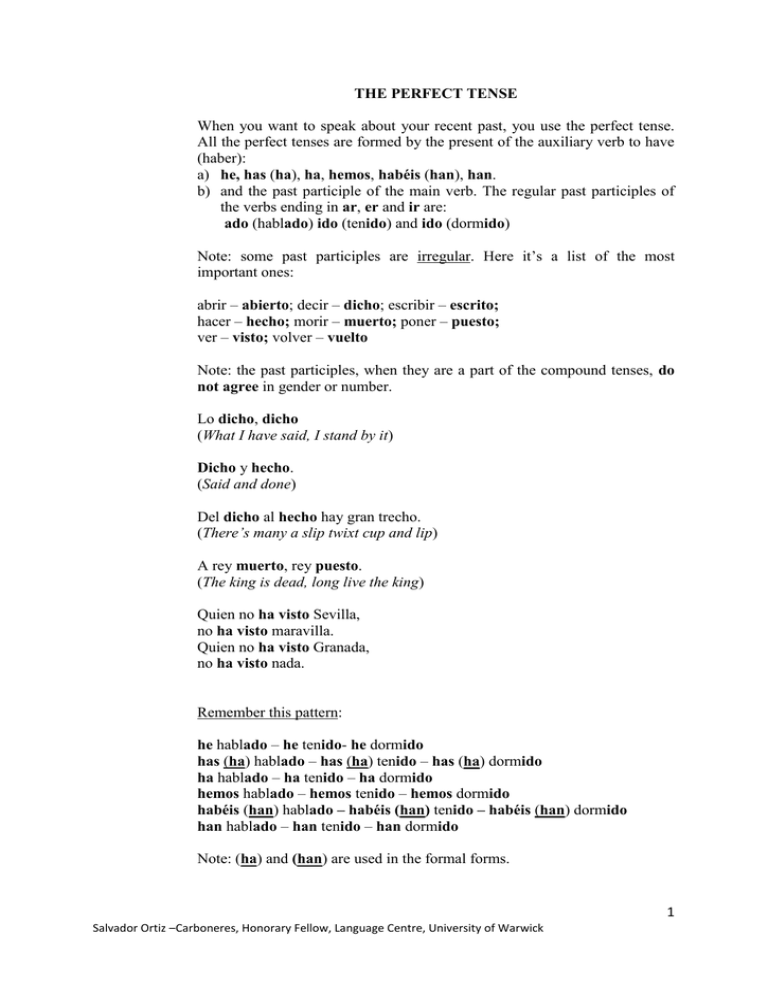
THE PERFECT TENSE When you want to speak about your recent past, you use the perfect tense. All the perfect tenses are formed by the present of the auxiliary verb to have (haber): a) he, has (ha), ha, hemos, habéis (han), han. b) and the past participle of the main verb. The regular past participles of the verbs ending in ar, er and ir are: ado (hablado) ido (tenido) and ido (dormido) Note: some past participles are irregular. Here it’s a list of the most important ones: abrir – abierto; decir – dicho; escribir – escrito; hacer – hecho; morir – muerto; poner – puesto; ver – visto; volver – vuelto Note: the past participles, when they are a part of the compound tenses, do not agree in gender or number. Lo dicho, dicho (What I have said, I stand by it) Dicho y hecho. (Said and done) Del dicho al hecho hay gran trecho. (There’s many a slip twixt cup and lip) A rey muerto, rey puesto. (The king is dead, long live the king) Quien no ha visto Sevilla, no ha visto maravilla. Quien no ha visto Granada, no ha visto nada. Remember this pattern: he hablado – he tenido- he dormido has (ha) hablado – has (ha) tenido – has (ha) dormido ha hablado – ha tenido – ha dormido hemos hablado – hemos tenido – hemos dormido habéis (han) hablado – habéis (han) tenido – habéis (han) dormido han hablado – han tenido – han dormido Note: (ha) and (han) are used in the formal forms. 1 Salvador Ortiz –Carboneres, Honorary Fellow, Language Centre, University of Warwick Diálogo entre dos estudiantes Juan - ¿Diga? Miguel - Hola Juan, soy Miguel. Juan – Hola Miguel, ¿cómo estás? Miguel – Estoy bien. He estado muy ocupado. Juan - ¿Qué has hecho hoy? ¿Has trabajado? Miguel – No, no he trabajado; he descansado. Juan - ¡Qué vergüenza! (Shame on you!) Miguel – Y tú, ¿qué has hecho? Juan – Esta mañana he ido al bar. Miguel - ¿Qué has hecho en el bar? Juan – No lo sé. (I don’t know) Miguel - ¿Has bebido unas copas de más? Juan – No lo sé. La verdad es que bebo para olvidar. Miguel - ¡Qué vergüenza! Bebes como los peces, pero no lo que los peces beben. (S. Ortiz-Carboneres) Chiste (Joke) Una llamada telefónica en el circo. A.- ¿Diga? B.- ¿Es el gerente? A.- ¿Qué ha dicho? No lo he oído bien. B.- He dicho que quiero hablar con el gerente. A.- Soy el gerente. B.- Señor, quiero trabajar en su circo. A.- ¿Qué sabe hacer? B.- Yo hablo. A.- ¡Qué estupidez! Eso lo hace todo el mundo. B.- Pero es que yo soy un burro. Trabalenguas (tongue-twister) Me han dicho que has dicho un dicho, un dicho que he dicho yo; ese dicho que te han dicho que yo he dicho, no lo he dicho; y si yo lo hubiera dicho, ( and if I had said it) estaría muy bien dicho (it would be very well said) por haberlo dicho yo. (for me having said it.) 2 Salvador Ortiz –Carboneres, Honorary Fellow, Language Centre, University of Warwick He escrito y publicado innumerables versos. Casi todos hablan del mar y también de los bosques, los ángeles y las llanuras. He cantado las guerras justificadas, la paz y las revoluciones. (Rafael Alberti, 1903-1999) En mi soledad he visto cosas muy claras que no son verdad. (Antonio Machado, 1875-1939) Dejad el portón abierto, mi hermano no ha vuelto. (S. Ortiz-Carboneres) ******************************** 3 Salvador Ortiz –Carboneres, Honorary Fellow, Language Centre, University of Warwick
